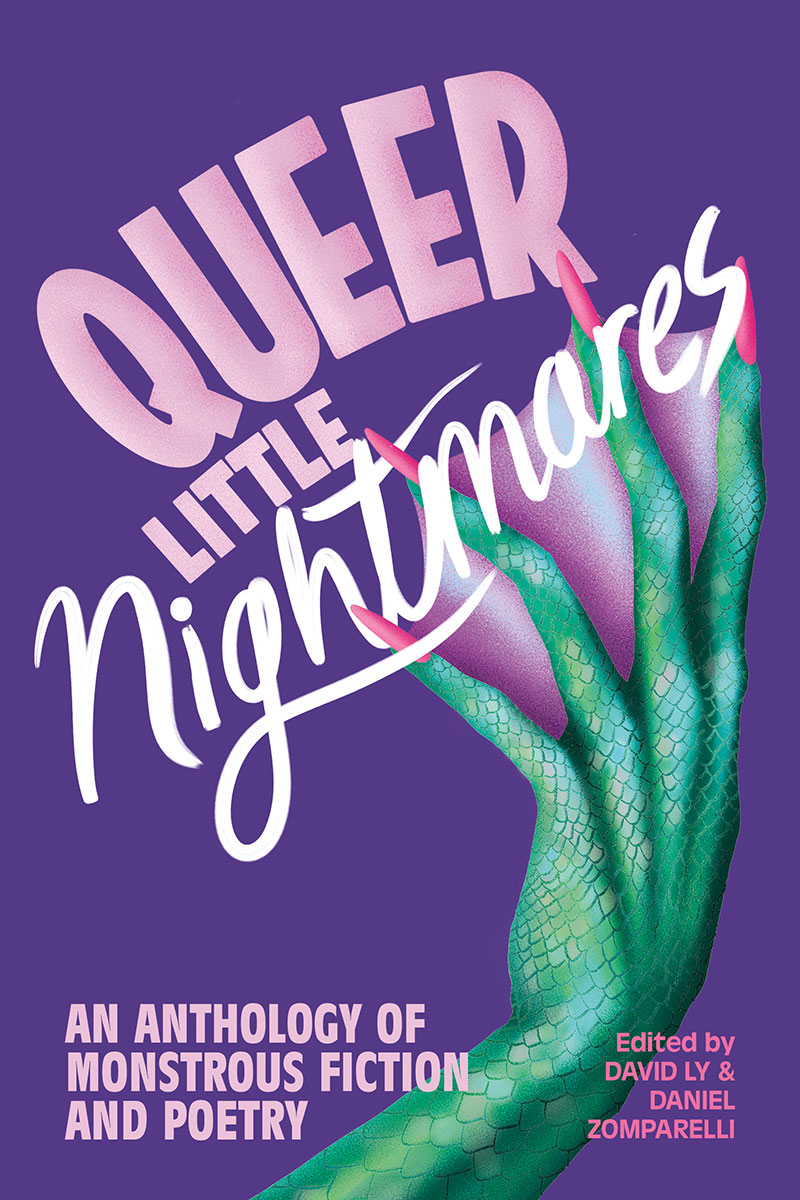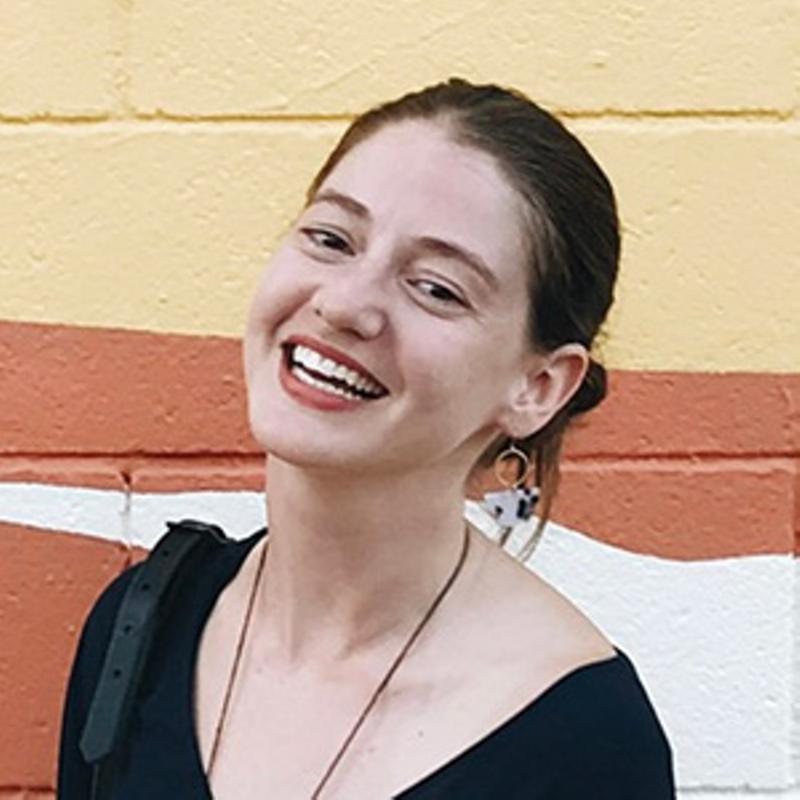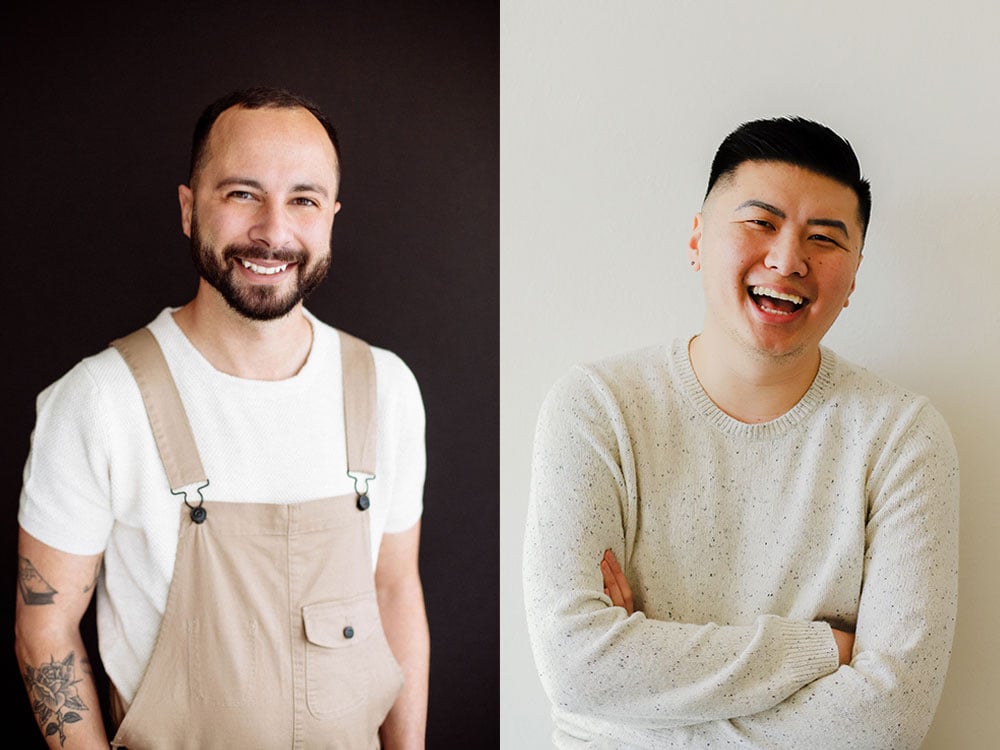It's spooky season. In October, the night arrives sooner and lingers longer. Deformed pumpkin faces leer at you from every porch. Leaves crunch underfoot like fragile skeletons. Halloween decorations assail you from drugstore aisles, overwhelming you with a sinister and inescapable truth: come Nov. 1, they’ll be replaced by Christmas decorations. What better time to sink into an unsettling collection of short fiction and poetry that wraps you in a cozy, chilling embrace?
Authors Daniel Zomparelli and David Ly, who share a love of poetry and horror movies, have crafted the perfect seasonal treat to cap off your October reading. Queer Little Nightmares: An Anthology of Monstrous Fiction and Poetry, published by Arsenal Pulp Press, is an exuberant and wildly creative collection that explores the queer subtext of monstrous tales and revels in their power and allure.
Ly is the poetry editor of This Magazine, and author of the poetry collections Mythical Man and Dream of Me as Water. Zomparelli is the author of poetry collections Davie Street Translations and Rom Com (co-published with Dina Del Bucchia) and the short story collection Everything is Awful and You’re a Terrible Person. After meeting at a poetry reading, Ly and Zomparelli discovered they both loved horror — a common interest that eventually led to the creation of Queer Little Nightmares, their first anthology.
Queer Little Nightmares is launching Oct. 21 as part of Vancouver Writers Fest.
From their respective homes in L.A. and Vancouver, Zomparelli and Ly joined The Tyee for a conversation about monsters, movies, and the innate queerness of horror. This interview has been edited for length and clarity.

The Tyee: What was the genesis of this collection?
David Ly: It was 2020, during the COVID-19 lockdown. I can’t remember who threw out the idea first, but we were like, “What if we did something crazy and made a book?”
Daniel Zomparelli: My anxiety was really high, which makes me super productive. So I was bugging David, like, “Let’s make this anthology. What if I started my own press? This can be the first book!” I freaked you out a little, and you were like, “Hmm, that sounds like a lot.” So then we decided to pitch it to Arsenal Pulp Press.
I haven’t seen a lot of anthologies that combine poetry and fiction like this — usually it seems like they’re one or the other. In Queer Little Nightmares, you’re alternating between them and giving each form equal space.
Zomparelli: It’s not common. But when an anthology has a theme, I appreciate when there are both poems and short fiction. When it’s all poems, I think, this could be broken up with a story.
Ly: In an anthology, you’re already reading these individual, self-contained narratives, and a poem can be that too. So why not throw them in?
The collection includes 32 authors, including the two of you. There’s an impressive breadth of monsters and interpretations of monstrosity among the pieces. Did you have to be strategic when you put out your call for submissions, to ensure you weren’t going to end up with two Medusa stories?
Ly: We wanted a balance of iconic, cinematic monsters, but also some that were unexpected. So the call was worded generally, like: What is a monster to you and how does it resonate? And some poems and monsters really stood out to me, like Kelly Rose Pflug-Back’s “The Kyrkøgrim,” because they were so surprising and added a different feel to the collection.
But it’s funny you bring that up, because we received a lot of submissions, and I remember going through so many Medusa poems. I felt like a bad queer because I didn’t know Medusa resonated so much with queer people. I’m glad we included one that really stood out, jaye simpson’s “#WWMD?”
Zomparelli: I was surprised because I thought there would be more repeats, but the fiction was thankfully all over the place. The common theme was that there was no actual monster, or the monster was metaphorical. And I had to say, “Oh no, sorry — we meant literal monsters.”
How many submissions did you get?
Zomparelli: We read hundreds and hundreds, for something like six or eight spots. For fiction, I could choose three or four stories, and we had about two hundred story submissions.
Ly: I think the poems came to three or four hundred. It was an experience.
Zomparelli: And then you feel bad, because there were so many we could have published, but financially you just can’t keep saying yes. We had maxed out our budget.
Ly: We had to make a list, like, “Okay, what monsters do we have here?” And then we whittled it down to the monsters we wanted in the book, which was hard.
I’m interested in how you both define a monster. What does that mean to you?
Ly: Well, I’m reading a horror novel right now, A Cosmology of Monsters by Shaun Hamill. It’s about a monster that’s been haunting a family for generations, and everyone is afraid to touch it or talk to it, but there’s one little boy — the youngest in the family — who interacts with the monster. It becomes a source of comfort for the boy, as a reprieve from his sad, broken family. And that’s what I was looking for in the collection: monsters that were spoken to in a tender way, even though others wouldn’t look at them with tenderness. To me, I think monsters are things that people are scared to embrace or even look at.
Zomparelli: That hits on what I see as a monster, which is something otherworldly. What makes them terrifying is what’s unknown about them, and why they don’t belong in this reality. Which is why they become such complicated and likable queer icons.
Ly: There’s that curiosity about them, right? Like, what makes them so terrifying?
Zomparelli: And who do they terrify?
In the collection, the monsters evoke a sense of desire. Whether that’s the narrator who is attracted to the monstrous part of themselves, or attracted to the monster that they encounter. I wonder if you think that’s inherent to the genre. Is it true that whatever scares us also attracts us?
Zomparelli: Yeah, because even in something like Jordan Peele’s Nope, where the alien monster sucks them up and eats them, there’s still a draw. People still want to photograph it. Even though it’s just a void that consumes you, there’s something that draws people to it.
Do you remember the first horror movies or monsters that clicked for you?
Zomparelli: For me, it was Freddy Krueger [from A Nightmare on Elm Street]. I was like four or five —
Daniel!
Zomparelli: My sisters would always rent horror movies, so it was just a thing that was available to us. I remember that scaring me so much, and my sisters telling me during the credits that Freddy was going on tour. They told me that the credits at the end said that he was coming, and he was specifically coming to Burnaby, B.C., where we lived. I remember me and my cousin freaking out, screaming, “That’s not true! We’d fight him!” But pretty soon afterwards, Freddy became my favourite — that fear turned into love.
Ly: For me, it was The Ring. I was probably 10 or 11. I remember the adults in my family would always talk about how it was so terrifying, and of course we weren’t allowed to see it. But I think one year, probably during a Thanksgiving dinner or something, with broad daylight outside, my cousins and I put in the DVD. We were just screaming over how scary it was. Ever since then, The Ring, and Samara as a ghost monster, has always been terrifying to me. Any story that’s about how a tragedy results in this terrifying monster is very interesting to me — the idea of turning trauma into fear, and wielding that fear.
And like Daniel, over time, I kind of wanted to push the boundaries a little more. Like, what else out there is really scary that I could watch?
Do you think that queerness is innate to the genre? Characters like Samara in The Ring, or Frankenstein’s monster, are feared and rejected because they’re different. It seems like a perfect analogy.
Zomparelli: One hundred per cent. Frankenstein’s monster and Dracula have been read as queer for a very long time, and I think queerness is extremely embedded into those stories. That’s even where our title comes from: I was working on a poem that used text from Frankenstein and Dracula that only used sentences including the words “queer” or “gay.” I found this line, queer little dreams, and we just turned “dreams” to “nightmares.” Queerness and gayness is inherent in the text and everything they did. I believe the authors had that intention, beyond just the word usage.
And when it comes to Freddy, there’s a documentary [Scream, Queen!] about the second movie that talks about how it was queer-coded, to the point where it actually kind of ruined lead actor Mark Patton’s career. He couldn’t find work afterward, because of the backlash.
Wow, really?
Zomparelli: Yeah, because it was just so adamantly queer. And the director was queer too, but he says he didn’t do it on purpose. In the documentary, though, they hint that it was intentional. So queerness has always been there.
What’s your horror tolerance like now? You both started pretty early with intense films. Where do you even go from there?
Ly: My tolerance is lower now. I get scared more easily. My boyfriend and I just watched this movie on Netflix, Incantation. It’s so terrifying. It’s about curses and this demonic deity that people worship, but the less you talk about the deity, the more powerful she gets. It’s really weird and scary. But I can always rewatch horror movies where I know what’s going to happen. Like, I’ll put A Nightmare on Elm Street on in the background while I’m writing.
Zomparelli: My tolerance has gone up. I can watch anything. And will watch anything. We’re in Halloween season, and my husband Gabe does not like horror as much, but during this time of year he knows we have to watch a lot. He gets scared, but he’s less scared now, because when I see something scary I laugh. My fear response is finding it funny. So he said he’s less scared because I’m sitting right there laughing.
So what are you forcing Gabe to watch right now?
Zomparelli: He chooses them now, which is nice! We just watched X.
Ly: Oh, I liked that one!
Zomparelli: I enjoyed it. I’m not a big slasher fan, but the visuals and the way it was edited was interesting.
What elements really work for you in a horror movie?
Ly: I’m not drawn to gore. For me, I really like horror movies that are built around trauma. Trauma that’s unspoken, and the weird ways that it manifests. There’s a movie coming out soon, called Smile —
Zomparelli: Oh, I can’t wait to see that!
Ly: There’s something very intriguing about that one. But I’m also always down for an otherworldly monster, like a kaiju, just a big-ass monster.
Zomparelli: Trauma is also the thing I go for. Trauma stories have really made a resurgence in a way I’m enjoying — Hereditary, Midsommar. Where everything is building up from something that you’re holding inside you.
Ly: Yes! Something that we don’t know anything about. Hereditary is the one movie that I saw in theatres and I just don’t think I can ever watch it again.
Zomparelli: It’s scary as shit and also so gross. The trauma is too big!
Ly: Too much for my body to handle.
Zomparelli: I actually watched a pre-screener of Hereditary from before they added the CGI. So I do need to watch it again because it was so funny — there would be a scene with text reading “PUT IN ANTS HERE,” or “PUT FIRE HERE.” There was one scene with a guy who was supposed to be on fire, but it was just a big foam figure, with a split screen of Toni Collette screaming.
I think I could handle watching that version. I wish they’d release it in theatres. Have you guys seen the supercut of Jamie Lee Curtis saying “trauma” over and over when talking about her movies?
Ly: No!
Zomparelli: No, but I want to watch it.
Are you looking forward to the launch event at Vancouver Writers Fest?
Ly: I’m excited to have contributors read their work out loud. We’ve been working with everyone and their pieces through a screen, and you don’t get to hear the voice of the writer. To have that altogether on stage at the festival will be fun. And I hope there will be costumes — that will make it fun too!
Zomparelli: I’m very excited to just hang out with contributors. I don’t live in Vancouver anymore, so it’ll be fun to celebrate with people. The book process can be kind of lonely, especially if you don’t live where anyone else lives.
What are you most excited about now that the collection is out?
Zomparelli: I just hope people have fun with it. There’s a lot of darker stuff, but there’s a lot of fun too. I just want people to consume it like Halloween candy— just enjoy it and try to consume it all at once.
Ly: Daniel and I created this because we have such a good time with horror, and I just want that to come through. And I think it does, because it’s so eclectic. You’ll read a short story that’s funny, and then jump to a poem that’s on another end of the emotional spectrum altogether. It’s a wild ride.
'Queer Little Nightmares' launches in Vancouver on Oct. 21 as part of Vancouver Writers Fest. ![]()
Read more: Books, Gender + Sexuality, Film
















Tyee Commenting Guidelines
Comments that violate guidelines risk being deleted, and violations may result in a temporary or permanent user ban. Maintain the spirit of good conversation to stay in the discussion.
*Please note The Tyee is not a forum for spreading misinformation about COVID-19, denying its existence or minimizing its risk to public health.
Do:
Do not: